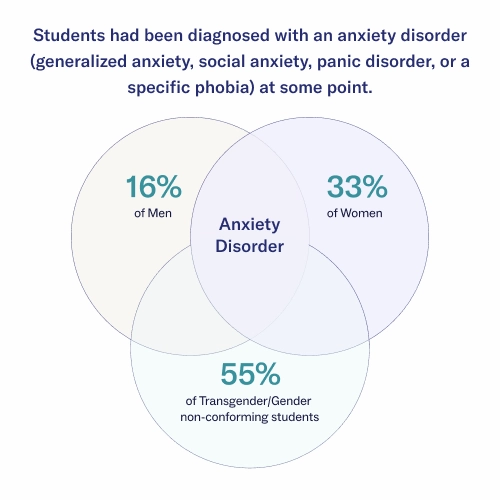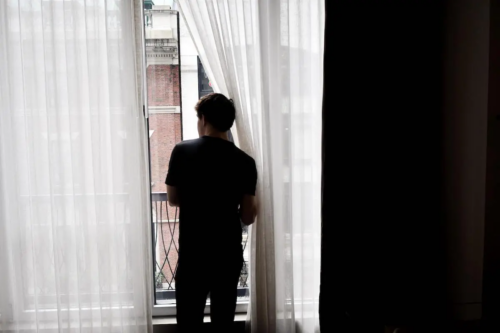
Table of Contents
How Online CBT for Social Anxiety Can Help Treat Teens and Young Adults

Written By: Brian Mastroianni

Clinically Reviewed By: Dr. Don Gasparini
November 3, 2022
8 min.
Peer-reviewed research shows the positive impact of internet-based cognitive behavioral therapy on the mental health of young people with social anxiety disorder.
Learn more about our Clinical Review Process
Table of Contents
Have you ever had a sense of creeping anxiety at the prospect of socializing? Do you have a fear of being judged by others or trepidation over the fact that other people are evaluating your every word? Do you notice that your feelings of nervousness cause you to trip over your own words, stammer while trying to make small talk, or even blush?
These are some of the most common signs of social anxiety disorder, or social phobia. For those looking for solutions to best tackle this persistent social anxiety, online cognitive behavioral therapy (CBT) might be the right treatment option for you.
What is social anxiety disorder (SAD)?
Social anxiety disorder, or SAD, is a kind of anxiety disorder that is marked by anxiety or fear spurred by interacting during or being around social situations. This might include going out to a crowded restaurant or bar, participating in group activities, or even working out publicly at a gym.
Social anxiety disorder can affect people of all ages, from all walks of life. These phobias tied to your social skills or perceived inability to engage with the world around you can seriously impede your day-to-day life and relationships. For a young person, SAD can make it difficult to do well in school, make new friends, be able to perform well in group activities, or adapt to new environments.
Common symptoms of social anxiety disorder
There are a range of physical and behavioral symptoms associated with SAD.
Physical symptoms and emotional signs include:
- Excessive anxiety in common social situations
- Intensive fears that last for days, weeks, and sometimes months before engaging in a social situation
- Rapid heart rate, shortness of breath, and nausea
Behavioral signs and symptoms include:
- Avoiding places where you might encounter people socially
- The prevalence of recurring negative thoughts
- Turning to alcohol or substance use in order to calm your nerves before social events
- Doing everything you can to avoid being noticed and staying as quiet as possible
History of social anxiety disorder
SAD was formally acknowledged as its own distinct “phobic disorder” in the mid-1960s. It typically begins during one’s childhood and teen years. Most adults who seek therapy for social anxiety disorder report that they developed social anxiety as young adults and teens, mostly before hitting their 20s. A smaller number develop social anxiety disorder later on in adulthood.
Do you need more support with
your mental health?
Charlie Health can help.
How common is social anxiety disorder?
SAD affects nearly 1 in 10 teens from 13-18 years old in the U.S. Within that number, 1.3% of teens and young adults have severe social anxiety disorder. Social anxiety disorder is also notably higher among young girls, at 11.2%, compared to boys at 7%.
Adults are affected as well. Approximately 15 million American adults are living with SAD, according to the Anxiety & Depression Association of America.
While effective therapy is widely available, not every young person with SAD receives the support they need. Estimates reveal that less than 20% of adolescents with social anxiety disorder receive the teen mental health treatment they need. Additionally, less than 20% who do seek support receive vetted, evidence-based therapeutic interventions.
How is SAD diagnosed?
It’s an issue that sometimes goes undetected at first. SAD might be less readily obvious to teachers, parents, and guardians – the signs and symptoms might resemble those belonging to other mental health issues. A provider will examine if other conditions are causing your social anxiety disorder, or if it is co-morbid with another physical or mental health condition.
To assess whether you have SAD, your provider will base their diagnosis on a range of criteria, which include:
- A physical exam to determine whether medications you’re taking or an underlying condition is causing your symptoms
- A review of self-reported questionnaires on your symptoms
- Assessing your symptoms and analyzing the frequency of symptoms and when they occur
- Going over a list of different scenarios and determining if they might trigger your SAD symptoms
What is cognitive behavioral therapy (CBT)?
If all of this resonates with you, one helpful solution, according to research, is virtual CBT for social anxiety.
CBT refers to solutions for addressing conditions like depression, substance use issues, eating disorders, and a variety of anxiety disorders, including social anxiety. Cognitive behavioral therapy centers around principles grounded in the theory that a person’s psychological problems stem from distorted ways of thinking and learned patterns of “unhelpful behavior.” CBT directs people with these mental health issues to better methods for coping with their symptoms.
This therapy utilizes methods designed to positively change people’s thought patterns. Ultimately, it is geared toward easing and unburdening people from their symptoms so that they can go about their daily lives with greater ease.
CBT has been shown to provide support for people with SAD. In one example, a man who found his chest tightening when experiencing symptoms of anxiety was able to explore and unpack the reasons behind that tightening sensation. To interrogate his conviction that this tightening was the result of a serious illness, a therapist used CBT for social anxiety to guide him through other potential scenarios related to his social phobia: Is he consuming more alcohol or caffeine than normal? Is he exercising more than he typically does? Is he experiencing increased stress at work or home?
By going through these different possibilities, CBT helped this man ease his anxiety associated with this tightening sensation, especially as it may relate to a specific social interaction.
CBT is also effective at helping those who experience social phobia tied to being on the autism spectrum.
Internet-based CBT, or ICBT, can be especially powerful for providing solutions for mental health conditions. Virtual CBT tools have been shown to be effective for depression, with both unguided and guided tailored therapy administered by a CBT therapist proving to be a strong approach for helping people with their depression. Our own Intensive Outpatient Program (IOP) is a solution that incorporates virtual CBT to help young people with conditions such as SAD.
How online CBT can help with social anxiety
A 2016 review in the journal Guided Internet-Based Treatments in Psychiatry paints a picture of the effectiveness of virtual CBT for social anxiety.
The paper’s authors write that online cognitive behavioral therapy tools “have been proven to be effective in at least 16 randomized trials” and found to be equally as effective as in-person therapy for social anxiety disorder based on responses from participants.
In an era when telehealth services have only grown in popularity and accessibility, digital resources for social anxiety might be the best path for those who are looking to ease their symptoms, especially in a time when more people are engaging in social settings as we emerge from the height of the global COVID-19 pandemic. The need for anxiety therapy is also skyrocketing, with nearly 6 million young people diagnosed with symptoms of anxiety between 2016-2019.
Recent research has shown the rise of virtual therapy over face-to-face CBT in general. With social anxiety, virtual CBT treatment has been found to not just be a highly “cost-effective treatment,” but also one that is geographically accessible. You don’t have to drive or use public transportation to seek a therapist who can help with not only social phobia, but also obsessive compulsive disorder, depressive symptoms, and other mental disorders.
Complementing this, a 2021 randomized clinical trial also points to virtual ICBT as being “an efficacious and cost-effective intervention for children and adolescents” with social anxiety disorder and related fears around anxiety provoking situations. The researchers provided 103 children and teens, ranging in age from 10-17, 10 weeks of therapist-guided virtual CBT for SAD.
The authors conclude that implementing therapist-guided online therapy programs for young people have marked positive impacts on social anxiety symptoms and anxious thoughts and also make therapy more readily available and accessible.
A 2022 study out of Hong Kong also highlighted just how beneficial virtual CBT can be for social anxiety disorder.
Study participants used a guided online therapy program, while a control group was put on a waitlist for using the service. The researchers found those in the program had “significantly reduced social anxiety symptoms,” with 86% showing remission from social anxiety symptoms.

The benefits and appeal of virtual therapy for teen mental health
Online therapy can help teenagers and adolescents better manage and understand their mental health in a way that is more accessible than in-person therapy options, particularly for social anxiety treatment.
It also is effective in meeting young people – used to chatting online and on social media – where they are. Face-to-face therapy can bring the burden of travel and social stigma around feared social situations.
In fact, a 2016 study shows 72% of adolescents reported they would access online therapy if they were in need of mental health support. In the same study, 32% of respondents revealed they would opt for online over traditional face-to-face therapy.
Another study found that virtual therapy options were preferred by teenagers who were seeking therapy for sensitive topics like discussions over sexuality. Students who reported experiencing psychological distress were particularly drawn to online therapy over face-to-face counseling.
How can Charlie Health help teens and young adults with SAD?
Every teen and young adult traverses their own unique path when it comes to managing their mental health. That is especially true for navigating something like social anxiety disorder. One young person’s struggles with SAD might not be the same as that experienced by a friend or classmate.
That’s where Charlie Health’s virtual IOP program comes in. Our mental health providers bring the benefits of one-on-one and group sessions directly to your home for multiple sessions each week. Charlie Health’s approach incorporates tailored solutions specific to your needs. Our programs offer virtual CBT that connects you directly with a therapist and other young people through virtual peer-support groups. Virtual programs can level the playing field in who has the most readily available avenues to seek CBT for mental health conditions like SAD.
Mental health conditions like social anxiety disorder are addressed head-on, getting to their roots. Virtual CBT is one of our specialties, effective at addressing SAD in addition to other anxiety disorders. One single, rigid approach for helping you seek solutions for why you experience social anxiety and its impacts on your life might not work for everyone. This is why tailored online CBT that gets to the heart of why you are experiencing symptoms of SAD is so effective. It’s a personal choice and finds what works for you.
You are not alone in managing your SAD symptoms. The anxiety that stems from participating in school or engaging in social environments is very real – it can feel overwhelming. We’re here for you. Start your healing journey today.





